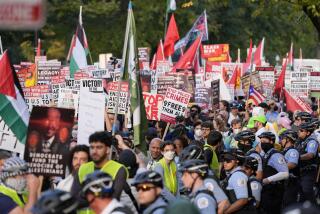Protesters Learn How to Take the Heat -- Legally
- Share via
NEW YORK — Not every protester descending on Manhattan for the Republican National Convention expects -- or intends -- to be arrested, but it can be an occupational hazard.
With that in mind, organizers of street demonstrations here are offering training sessions on what to expect from the New York Police Department and on how to navigate the legal system for those who end up in handcuffs. The free-form sessions are part street theater and part 1960s agitprop, with heavy doses of practical self-help advice.
At St. Mark’s Church in Greenwich Village on Friday evening, young protesters with dreadlocks and body-piercings were “arrested” by training volunteers playing the roles of New York’s finest -- complete with NYPD caps, nightsticks and doughnut wisecracks. Most of the protesters quickly dug themselves into legal trouble, with their mistakes pointed out and corrected during follow-up role-playing.
The session, titled “Know your rights! And going through the system,” was sponsored by the People’s Law Collective and the New York City chapter of the National Lawyers Guild. It dispensed advice on everything from whether to give your real name if arrested (usually), when to shut up and ask for a lawyer (almost always) and whether you have ready access to a toilet in jail (don’t count on it).
Volunteers handed out pocket cards -- “Street law: What you need to know during the RNC protests” -- and body tattoo stickers printed with a 24-hour toll-free hotline for free legal help. In addition, as many as 600 volunteers from the lawyers guild will be on the streets to monitor police conduct and assist protesters, organizers said.
The first major showdown between protesters and police could come today. On Friday, the ANSWER coalition, which was prohibited by court order from staging a large protest in Central Park, encouraged its supporters to gather there nonetheless.
In addition to the legal sessions, organizers are offering seminars on how to avoid being arrested, how to deal with police in crowd-control situations, and how to mount effective nonviolent civil disobedience. Some groups among the hundreds expected to protest at the convention have said they will engage in nonviolent but disruptive acts.
A coalition called A31 Direct Action promised a series of “nonviolent civil disobedience and direct action” protests on Tuesday, the second day of the four-day convention. Some supporters of the group, including New York City Council member Charles Barron, suggested they also would protest in Central Park on Sunday despite a court order prohibiting a huge rally proposed there by a coalition of anti-war activists.
On its website, the People’s Law Collective portrays police as wily adversaries. Advising protesters to “know your rights with the man,” the site offers advice on how to handle the heat. Among the suggestions: “You do not need to speak to cops” and “Remember that rights do not always equal reality.”
Throughout the two-hour legal session at St. Mark’s, volunteers led about two dozen young people in a chant of what they called protesters’ magic words: “I am going to remain silent. I want to speak to a lawyer.”
“It’s never too late to re-invoke your right to remain silent,” Greg Michalec, a volunteer with the Midnight Special Law Collective in Oakland, told the group. “But it’s better not to talk at all.”
Michalec, who said he had been trained in some legal matters but was not a lawyer, advised his charges never to trust a police officer. “Cops will lie to you to get what they want,” he said. “They’ll try to trick you too.”
In one session, Michalec portrayed the good cop while another volunteer, Paul Marini, portrayed the surly bad cop. Marini threatened a young man taking part in the session and groused about “godless anarchists” sullying his beloved New York City. The protester, who had invoked his right to remain silent, began talking again -- a common mistake, Marini and Michalec said afterward.
The volunteers handed out a map showing permanent and temporary police detention facilities, and described the booking and arraignment processes. They advised effective ways to, for example, end a police officer’s questioning -- asking, “Am I free to go?”
When it was over, Marini offered parting advice: “Basically,” he said, “just use your street smarts.”
More to Read
Sign up for Essential California
The most important California stories and recommendations in your inbox every morning.
You may occasionally receive promotional content from the Los Angeles Times.











